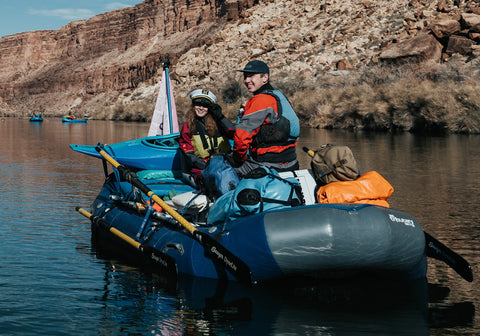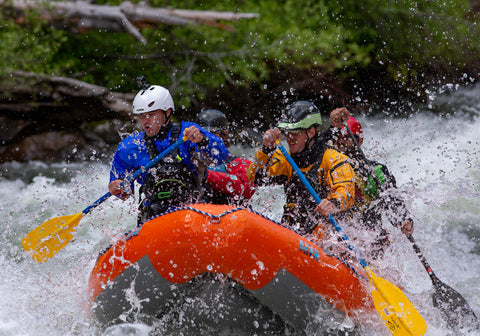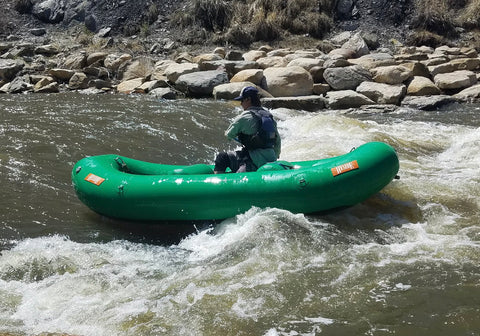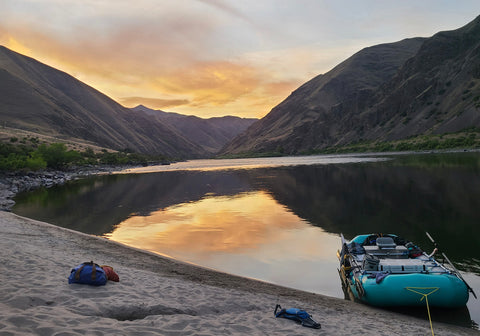Find the Right Whitewater Raft
Thinking of purchasing your own rig? Follow our guide to finding the right whitewater raft for you, written by CKS’ own Resident Rafting Guru (no seriously, everyone on staff scours Jake’s brain before making any major rafting purchases).
The first and most important question you need to ask yourself is:
“What do I want to do with my raft?”
Seems straightforward enough, but most people assume that all whitewater rafts are fairly similar and end up anchoring the price as the delineating factor between brands and models.
We’ve found that this couldn’t be further from the truth.
When buying a new raft, be conscious of these 3 factors (other than price):
1. Boat shape2. Boat size3. Boat material
When buying a whitewater raft, there are several important factors to consider in order to ensure that you get a high-quality, durable, and safe raft that will meet your needs and preferences. Some of the key things to consider when buying a whitewater raft include:
Boat Shape
Shape is the first choice to make. The shape of your boat determines what it’s used for.
Boat Shape
Pros
Cons
CKSO Favorites
Roundboats
Most versatilility
Stable
Good at punching through holes
Can handle a large paddle crew
Can handle a large amount of gear
Sluggish when weighed down
Paddlecats
High performance
Some versatility
Playful
Can’t hold a ton of gear or paddlers
Catarafts
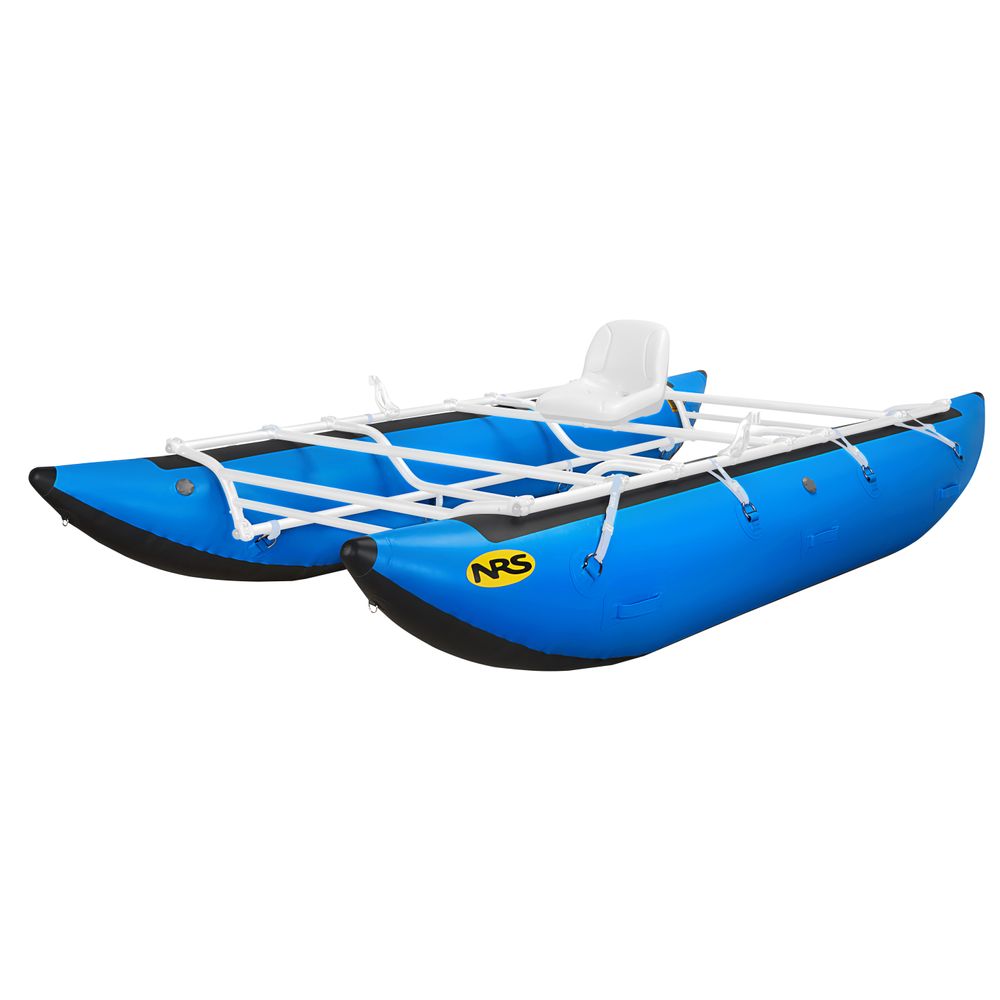
High performance
Fast
Better tracking
Least versatility (unable to run a paddle crew)
Least stability
Requires oars + oar frame
Not beginner friendly
Roundboats
A roundboat is what most people think of when they hear the word “raft.” Roundboats are the most common boat shape because they have high utility and versatility. They can be used as a paddle raft, a gear boat, or a fishing boat. Their shape tends to make them slow and stable, and they can be a bit sluggish in whitewater when weighed down.
That being said, weight tends to be the determining factor when it comes to how a big hit plays out – the more weight in the boat you have, the more punch you have through waves and holes. Having a lot of gear or a big paddle crew is to your advantage with this boat shape.
Some of our favorite roundboats include the Hyside Max 12 and the AIRE 146DD.
Paddlecats
If you are in the market for a small yet versatile boat, a Paddlecat is what you want. Paddle cats are are very small Catarafts with tubes connected by immovable thwarts. Their design is intended to bridge the gap between the performance advantages of a cataraft and the versatility of a paddleboat.
Also known as “shredders,” a paddlecat is typically only meant for R2 (two side-by-paddlers).
In their element, paddlecats are a blast. They are about as useful as a sports car to a family of four when it comes to utility, so stay away from these unless you want a playraft only.
You can throw a frame on some paddlecats to row, but I would recommend against choosing a paddlecat altogether if you plan to row it more than you paddle it.
Some of our favorite paddlecats include the AIRE Sabertooth, STAR Slice and STAR Slice XL.
Catarafts (Catamaran Rafts)
Cat is short for Catamaran, meaning that there are two separate inflatable hulls instead of one inflatable unit in these types of rafts. In rafting, this equates to the boat being more metal than rubber, as the boat consists of two straight inflatable tubes that are secured to a central aluminum frame.
Cats are almost exclusively controlled by oars and are typically higher performing and faster than roundboats, but they lack the versatility that roundboats offer when it comes to carrying a crew or a large amount of gear.
Cats perform better against features in whitewater than a roundboat. A big wave or hole that could stall, surf, and flip a big roundboat may barely do anything to a cataraft. Since there is little volume touching the water’s surface, there is little volume that can be influenced by strong counter-currents.
Cats require you to be a more precise boater with carefully chosen lines. Placing one tube on the wrong side of an eddyline can result in a very abrupt change of direction.
However, in exchange for your precision, you are rewarded with speed, better tracking, and better whitewater performance than a similarly sized roundboat.
Choosing a Raft Size
It’s difficult to navigate the wide range of size offerings available for rafts, especially when rafts pretty much all look the same from their product photos.
The length and width of your raft is going to come down to personal preference, which is hard to pin down if you’ve never owned a boat before.
There are some common sizes and styles across all brands, kind of like common types of vehicles across auto manufacturers. Most brands have a Sports Car, a Crossover, and a Truck. Rafts are similar…
Size
Bottom Line
Great For
Not Great For
9.5′-11′
Small, nimble, quick on their feet
Fun runs/play rafting with small groups (3 paddlers max)
Technical sections with required manuevering
Day trips or small overnight trips
Longer trips that require gear storage
12′-13′
Versatile, Best of both worlds
Fun runs/play rafting with small groups (5 paddlers max)
Day trips or small overnight trips
Can take some of gear meant for larger boats like dryboxes and frames
Trips that require large coolers and/or dryboxes
14′-16′
Less performance, more room
Room for gear and passengers
Utilitarian
17’+
Rare
Their size makes them great for supporting really long trips. If you can take it on a river, an 18-footer will carry it
They are a behemoth to row, but they chug through just about all but the biggest hits
Impractical for most whitewater situations outside of 7+ day multidays
 9.5′ to 11′ Boats
9.5′ to 11′ Boats
Sports Cars of the rafting world.
Our favorites include
Star Slice Paddlecat
AIRE Cub
Hyside Mini-Max
12′ to 13′ Boats
Crossover Cars of the rafting world.
Our favorites include
Pro tip: While still small to store when rolled, this boat size may necessitate a car/truck trailer for transport
14′ to 16′ Boats
Trucks of the rafting world.
Our favorites include
Where will you paddle?
You will also need to consider where you plan on using your boat. Do you live on the headwaters of the Arkansas River in Colorado, or in Page, Arizona near the put-in for the Grand Canyon?
A boat that is king in technical water like that of the Arkansas will get swallowed by the large waves and high-volume flow on the Grand Canyon.
You should consider getting a size of boat that will perform well where you plan on using the boat 75% of the time.
Steer clear of anything under 14 feet for high-volume rivers unless you want big time play time
Avoid anything over 14 feet on a low-volume river
Most people who are in the market for a boat settle on the 14 footer, as it is the most versatile and capable size across a wide variety of situations.
We encourage you to make your own choice and take the time to consider what boat works best for you. Our paddle experts are happy to help you with the decision. You can chat and text with us during regular business hours.
Choosing a Material
Pretty much all inflatables start with a high denier nylon fabric as the base material, then are treated with an outer coating.
Generally there are two coatings
Synthetic Rubber (Hypalon, Pennel-Orca)
Plastic (PVC)
The patent for synthetic rubber is public and therefore this material is now produced under a few different trade names. The two most common names are “Hypalon” (Hyside) and “Pennel-Orca” (NRS).
Synthetic rubber is very expensive – upwards of twice as expensive as PVC.
There are certain material properties that can only be achieved with rubber. From abrasion resistance to cleaning and treating, synthetic rubber is the superior material and will last longer over time.
However, the vast majority of rafts are coated in Polyvinyl Chloride, or “PVC” to us normal folks. Chemically speaking, PVC is plastic. The same material that can be rigid to make things like pipes can also be treated with “plasticizers” that make the material a liquid coating that can be applied to fabric to reinforce it.
Let’s review the key differences between plastic and rubber:
PVC
(AIRE Super Puma)
Capable of withstanding high pressure (i.e. dropstitch inflatables)
Short repair time
Lower cost
Less abrasion-resistant
Heavier
Will not roll up as small
More susceptible to UV damage
Hypalon
(Hyside Mini-Max)
Highly abrasion resistant
Lightweight
Rolls up small
Long repair time
Higher cost
Incapable of handling high pressure
Slippery when wet
Now that we’ve highlighted the pros and cons of these materials, think about the price tag again. I want to caution folks from anchoring to price tag, as there are so many more important things to think about when buying a boat than what it costs, but the material the boat is made out of is the single most defining factor in price.
Consider buying a boat that is at least a thousand dollars more than the other of the same length and shape, based on its superior material. How long do you see yourself having this boat before upgrading?
Pro Tip: If you see yourself upgrading the boat in a few years, go PVC. If you see this purchase as something you will use for the better part of the next 20 years, go Hypalon or Pennel-Orca.
There is one exception to this rule: AIRE (and its sub-brand Tributary) makes a fantastic PVC boat that rivals the quality found in synthetic rubber boats. AIRE boats are designed with a separate urethane bladder system that is serviceable through a zipper that runs around the inside of the boat. If you have an issue, you can patch from the inside of the outer skin, which is a much more effective patch than only being able to patch from the outside. This feature is unique to AIRE and Tributary crafts.
You can also replace the internal bladders on AIRE boats if you are noticing leaks. They are the only raft manufacturer that builds boats using a component-based system, and are worth considering if you are buying a boat for long-term ownership. They also make boats in a really wide variety of colors, and offer a 10-year warranty that is the best in the industry.
If you really feel that a pricier boat (Hypalon/Pennel-Orca or AIRE) is what you are in the market for, remember that CKS Online offers payment plans for a product with this price tag. Check out Affirm financing–the rates are way better than a credit card in my experience.
Rafting is typically a sport enjoyed by the modest-income subsection of society, and having five or six thousand dollars lying around to drop on a new boat is something most normal people don’t have. Affirm makes it possible for normal folks to afford nice things. In short–don’t settle for a cheaper boat if it doesn’t fit your needs just because it’s what you can afford.
Originally posted July 07, 2021. Updated October 6, 2023.
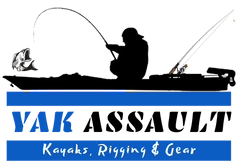
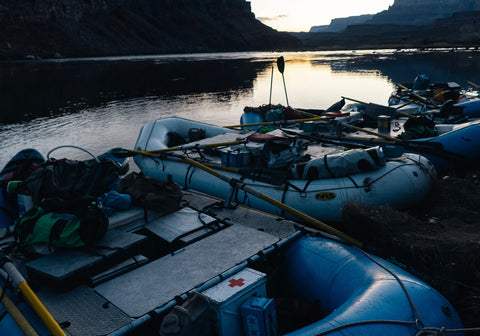
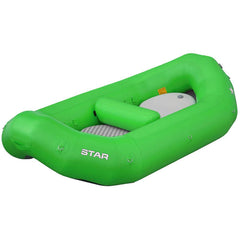
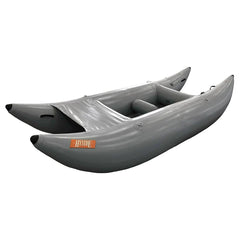
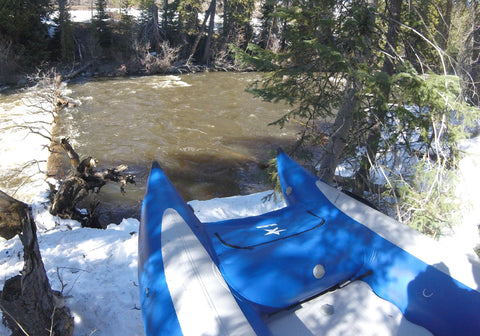
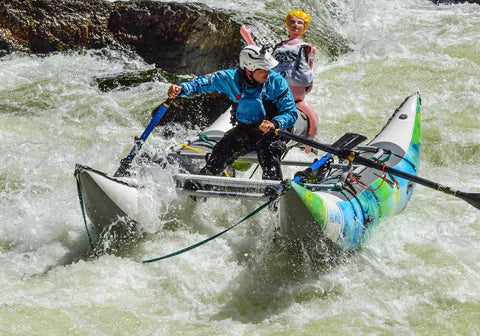
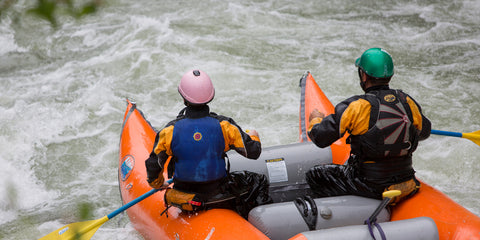
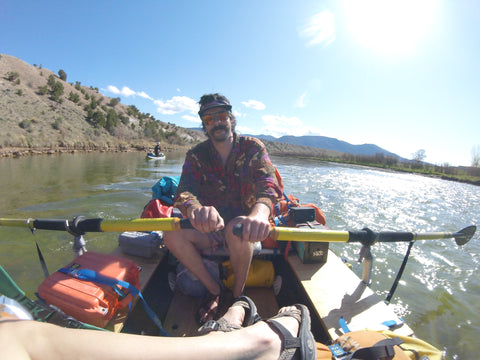 9.5′ to 11′ Boats
9.5′ to 11′ Boats